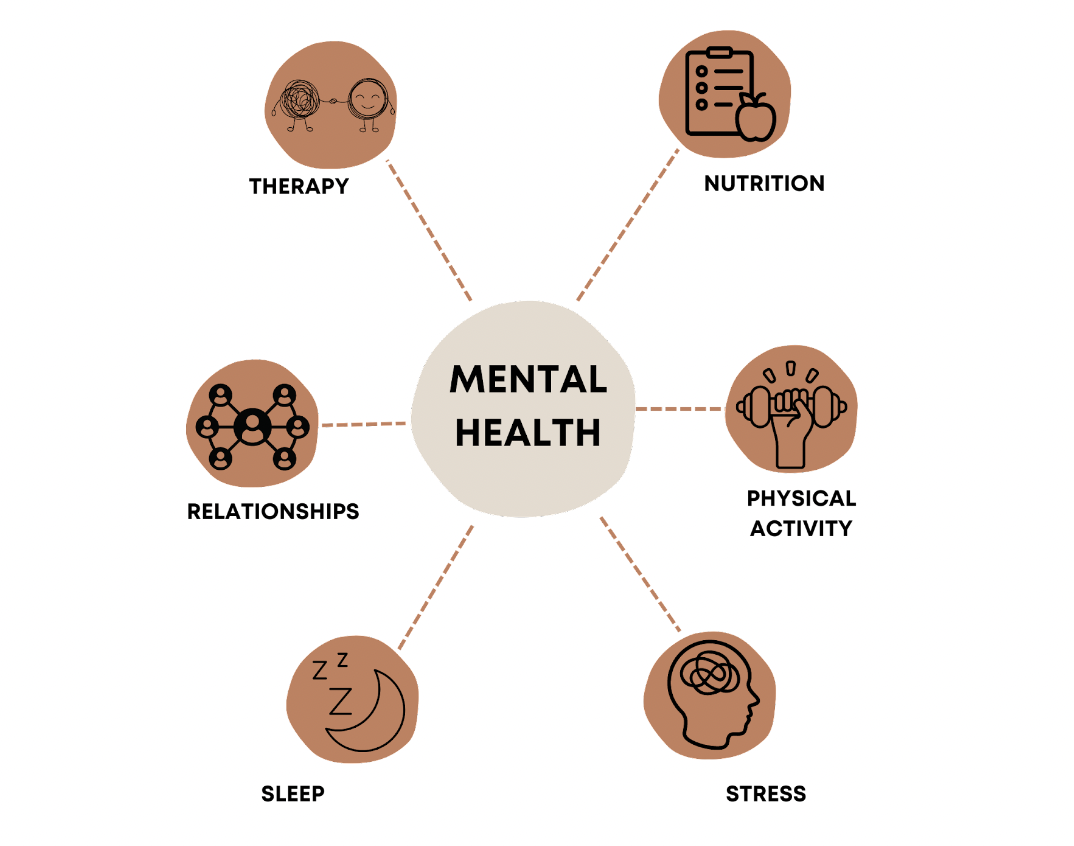How Nutrition Can Impact Your Mental Health
Many of us are aware how stress can affect our body, but did you know that what we eat is just as important as other lifestyle factors, like sleep and exercise, when it comes to our mental health?
Perhaps you’re already going to therapy (which is amazing!), but that’s only one piece of the puzzle. In order to better your mental health, there are numerous factors that should be considered that might also be impacting your mental health.
Nutrition
The role that nutrition plays in our mental health is a powerful one. For example, studies show that a diet high in refined carbohydrates and sugars can impair brain function, and even worsen mental health symptoms, like depression and anxiety.
The foods we consume have a direct impact on the structure and function of our brain and ultimately, our mood. Even when we are sleeping, our brain is responsible for our thoughts, movements, breathing, heartbeat and more. As such, our brain requires “fuel” to stay optimal…aka FOOD.
Think of the brain like an expensive car that needs premium fuel. High-quality foods (“fuel”) that contain nutrients, such as fruits, veggies and whole grains, can help power the brain and protect it from inflammation and free radical damage. On the other hand, eating low-quality foods like processed and refined foods can cause damage to it. Consuming refined sugar for example, like a candy bar, will spike insulin and promote oxidative stress within the body, which can have a direct impact on your mood.
It’s important to acknowledge bio-individuality. Everyone is different and what works for one person might not work for another when it comes to nutrition. As such, it can be helpful to note down how the food you’re eating makes you feel. Eventually, you might start to connect the dots and discover certain patterns. For example, maybe having too much sugar at a specific time of day makes you irritable, or maybe that second cup of coffee in the afternoon is causing you to feel fatigued later in the day.
With that being said, there are general guidelines that can be a great starting point for anyone looking to improve their diet. The Canadian Digestive Health Foundation has addressed 5 specific nutrients that can be found in whole foods and that have a positive impact on mental health:
B-vitamins: Help synthesize DNA, maintain fatty myelin covering neurons + help produce mood-altering neurotransmitters
Where: Whole grains, eggs, leafy veggies
Vitamin D: Helps produce dopamine and noradrenaline
Where: Fish (salmon or tuna), eggs, milk, or D3 supplements
Antioxidants: Can prevent oxidative stress that can lead to DNA damage or conditions like depression and anxiety
Where: Fruits and vegetables
Omega-3: Required for healthy cell membranes and efficient neuron communication
Where: fish, chia/flax seeds
Fibre: Maintain a healthy population of ‘good’ bacteria in your gut
Where: nuts, seeds, veggies
B-vitamins: Help synthesize DNA, maintain fatty myelin covering neurons + help produce mood-altering neurotransmitters
Where: Whole grains, eggs, leafy veggies
Vitamin D: Helps produce dopamine and noradrenaline
Where: Fish (salmon or tuna), eggs, milk, or D3 supplements
Antioxidants: Can prevent oxidative stress that can lead to DNA damage or conditions like depression and anxiety
Where: Fruits and vegetables
Omega-3: Required for healthy cell membranes and efficient neuron communication
Where: fish, chia/flax seeds
Fibre: Maintain a healthy population of ‘good’ bacteria in your gut
Where: nuts, seeds, veggies
The Gut-Brain Connection: How The Gut Impacts The Brain
The gut and brain communicate with one another bi-directionally through something known as the gut-brain axis. The healthy bacteria that live in our gut highly influence the production of neurotransmitters that affect our brain, such as serotonin. Did you know that up to 95% of our serotonin (the neurotransmitter that helps regulate our mood) is actually produced in our digestive tract? In fact, our gut is lined with millions of neurons that help regulate our emotions, in addition to helping us break down and absorb nutrients from the foods we eat. Here are some ways you can nourish the gut:
Consume probiotic foods, like kimchi and sauerkraut
Ensure regular bowel movements by staying hydrated and consuming fibre
Chew your food to a liquid
Eat in a relaxed state, away from technology and distractions
Start your day with warm lemon water
Eat a diverse diet full of colourful vegetables, whole grains, healthy fats and high-quality protein
Lifestyle
While nutrition is one of the many aspects that can affect your mental health, there are other lifestyle factors that are important too: Exercise, Stress, Sleep and Relationships.
Exercise
Various studies have analyzed the impact exercise can have on your mental health. Exercise has been shown to reduce symptoms of anxiety, stress, depression and help improve your overall mood. During physical activity, the production of our “feel good” neurotransmitters, known as endorphins, is increased, which can help you feel happy and relaxed.
Relationships
Toxic relationships can take a toll on our stress levels, nervous system, mental strain, happiness and emotional health. Studies have shown that the quality of our relationships can even be a major risk factor for depression and anxiety. If any of your relationships are damaging your self-esteem and causing ongoing negative emotions, it might be time to re-evaluate. You can start by seeking support from friends and family, and you can also consider therapy.
It’s important to remember to surround yourself with people who uplift you. Relationships aren’t supposed to be one-sided, and if they do feel that way, it may be time to address it in the relationship (or in therapy).
The key takeaway: Your mental health should be a priority! Nutrition and lifestyle factors have a significant impact on our mental health and how we feel both physically and emotionally.. Ensure that you are eating whole foods loaded with essential vitamins and nutrients, nourish the gut, limit processed foods, find a form of exercise that works for you and don’t underestimate the power of stress management, sleep, and social relationships.
If you’re looking for extra support, we’d be happy to book you in for a free 15-minute consultation with one of our wonderful therapists.



